SME
SME sector should encourage more women entrepreneurs: Seminar
Speakers at a seminar highlighted that the small and medium enterprise (SME) sector should encourage more women entrepreneurs, stressing that trade licensing processes and access to finance must be simplified and made more women-friendly.
They also emphasized that women’s active participation in the workforce is essential for the continued growth and prosperity of Bangladesh and reiterated JBCCI’s continued support and commitment to the cause.
Japan-Bangladesh Chamber of Commerce and Industry (JBCCI), an association for business development between Bangladesh and Japan, and the Japan External Trade Organization (JETRO) organized the seminar jointly on “Rights, Equality, Empowerment: A Discussion on Women’s Progress in Bangladesh” at a hotel in Dhaka on Sunday.
Deputy Chief of Mission at the Embassy of Japan in Bangladesh Takahashi Naoki thanked JBCCI for organizing this important session and acknowledged Bangladesh’s remarkable achievements in women's employment and empowerment.
Bangladesh, Japan forge stronger SME collaboration at ICOSA roundtable in Tokyo
“Japan believes that women empowerment and opportunities in employment are very essential for the progress of a country,” he said while speaking at the seminar as the chief guest.
He also mentioned Japan is working for the Rohingya and their wellbeing along with Bangladesh, according to a media release issued by the JBCCI on Monday.
Naoki also recognized JBCCI’s pivotal role in enhancing Japanese investments in Bangladesh.
Professor and Pro-Vice Chancellor, Department of Economics, University of Dhaka Dr Sayema Haque Bidisha and Country Managing Director, Oracle Bangladesh Rubaba Dowla attended the event as special guest.
The members of JBCCI and JETRO and representatives from different organizations in the public and private sector participated in the seminar.
Executive Director of JBCCI Tahera Ahsan moderated the seminar while the welcome speech was delivered by President of JBCCI Tareq Rafi Bhuiyan (Jun) where he highlighted the contributions of women to the economic development of Bangladesh.
Secretary General of JBCCI Maria Howlader delivered the key remarks where she highlighted where the global gender parity rates stand in line with the SDG goal no.5 and also iterated the call for action for achieving equality and parity for women.
President of Bangladesh Women Chamber of Commerce and Industry (BWCCI) Selima Ahmad also shared her views as a guest speaker and shared snippets from her experiences and hurdles as a professional woman.
Sayema Haque Bidisha mentioned around 50 percent of small and medium entrepreneurs are women.
She discussed the formal and informal sector employment divide between male and female workers and how 70% of women work in agriculture which is categorized as informal work.
She commented on the quality of female employment, not just to focus on quantity.
Rubaba Dowla emphasized that women's presence in the workplace is crucial for ensuring the sustainable growth of the economy. She noted that ’disruption’ is the call for the day and inclusive practices should be the norm by now rather than a special initiative.
She stressed on accelerating action and mentioned that it is time to start pushing invisible and divisive boundaries.
The event also featured a panel discussion, moderated by Tahera Ahsan. Panelists included Kazi Rubaiya Islam, Corporate and Media Relations Lead at JTI, Uzma Chowdhury, CPA, Director (Finance) at Pran-RFL Group and Aminata BA, Assistant Manager at Mitsubishi Corporation, Dhaka.
They shared personal experiences, highlighting the evolution and growing impact of women in various sectors.
The panelists observed that women entrepreneurs in Bangladesh are thriving and making significant contributions alongside their male counterparts.
They underscored the need for employment services that support women in the workplace such as maternity leaves and day cares and also emphasized the need for changing gender-biased mindsets and out social conditioning, at the household, professional and public spheres.
Uzma Chowdhury highlighted good industry practices from Pran-RFL in ensuring safety, security and maternity leave for women.
The performance of women is ahead of men employees in many sections. She add that maternity leave and daycare facilities have ensured women employees' dedication to serve the company
Anwar Shahid, Vice President of JBCCI thanked everyone for attending the program and appreciated all the discussants for their valuable insights and success stories which will inspire others too.
9 months ago
Sonali Bank reports Tk5,634 crore operational profit in 2024
Sonali Bank PLC has announced a significant operational profit of Tk5,634 crore for 2024, marking a Tk1,788 crore increase from the previous year.
The bank also outlined its strategic focus for 2025, which will include enhancing investments in the SME sector and improving service standards.
Managing Director (MD) Shawkat Ali Khan revealed the figures during a press conference at the bank's headquarters on Thursday, highlighting the bank’s resilience despite political instability and challenging business conditions.
In 2024, Khan said, their operating profit reached Tk5,634 crore, which is Tk1,788 crore higher than the previous year.
Sonali Bank's deposits for 2024 stood at Tk1,64,959 crore, reflecting an increase of Tk14,341 crore from the previous year.
BB-Dollar: Taka loses 12.72% value in 2024 as dollar strengthens
The bank’s loan disbursement reached Tk99,180 crore, although the outstanding figure saw a slight decrease due to adjustments made with government institutions at the end of the year.
The bank's advance-to-deposit ratio is currently at 60 percent.
Sonali Bank recovered Tk1,170 crore from non-performing loans and Tk59 crore from classified loans in 2024, Khan added.
In response to a query, Khan mentioned that the bank is pursuing legal action to recover loans from major defaulters, including Hallmark and TM Brothers Group.
1 year ago
Micro, small, medium enterprises in Bangladesh face a financing gap of $2.8 billion
In Bangladesh, the micro, small, and medium enterprises (MSME) sector faces a financing gap of $2.8 billion, according to IFC, a member of the World Bank Group.
With nearly 10 million SMEs contributing to about 25 percent of the country's GDP, enhancing SME financing is key to boosting economic growth, it said on Tuesday (November 28, 2023).
To explore the various aspects of financing for small and medium enterprises (SMEs) in Bangladesh, IFC, in association with Bangladesh Bank and the government of Norway, organized a conference in Dhaka.
Read: BTCCI to promote Bangladesh as 'gateway to South Asia' for Thailand
Experts, policymakers, and stakeholders from across the world shared their insights to help foster a resilient and inclusive environment for SME financing in the country.
The event touched upon the partnership between IFC and Bangladesh Bank, results of an impact assessment study carried out on women-owned SMEs, next-generation SME financing trends, and global best practices in SME financing.
It also addressed the challenges and opportunities in SME financing, identifying solutions and innovations in light of global SME finance developments.
Highlighting the joint efforts of IFC and Bangladesh Bank in SME financing, the conference showcased initiatives, including developing the country’s first Credit Guarantee Scheme (CGS), reforming an SME finance policy, and strengthening the sector’s capacity.
IFC’s impact study on CGS, supported by the Norwegian Embassy, revealed that the number of first-time borrowers receiving loans in cottage, micro, and small enterprises and the average ticket size of the loans for women-owned micro and small enterprises was statistically significantly higher after the launch of CGS than ever before. Women entrepreneurs who received CGS-backed loans reported that it helped their businesses survive amid crises and provided new impetus to thrive.
Speaking at the conference as the chief guest, Governor of Bangladesh Bank, Abdur Rouf Talukder, said that recognizing that cottage, micro, small and medium enterprises (CMSMEs) are the backbone of society, Bangladesh Bank is spearheading several initiatives to mainstream medium and small businesses into the financial landscape.
"This includes establishing a new and dedicated Credit Guarantee Department that has already piloted an online platform—the Credit Guarantee Information Management System—to help lodge applications seamlessly. We are at an important crossroads of economic development and must ensure that everyone, especially those who often get left out, can be part of the financial picture," he said.
Read: BGMEA chief for stepping up economic diplomacy to boost Bangladesh-US trade
Deputy Governor of Bangladesh Bank, Abu Farah Md. Nasser, said a strong SME sector is akin to a superpower for creating jobs, export earnings, and productive proficiency.
"Now more than ever, we need to work together to enhance credit guarantee schemes, tap into alternative databases for SME lending, and ultimately fast-track CMSME finance in Bangladesh. We want to bridge the gap between rich and poor, make sure men and women have equal opportunities, and boost economic growth across the country," he said.
Martin Holtmann, IFC Country Manager for Bangladesh, Bhutan, and Nepal, said Bangladesh is rapidly accelerating its economic development, and creating more and better jobs is a priority they share with the country as long-term partners since 1985.
"IFC’s collaboration with Bangladesh Bank to develop SME solutions highlights a milestone in achieving financial inclusion and economic advancement and underscores the transformative power of partnerships, innovation, and our collective commitment to progress. We aim to increase access to financial products that are affordable, sustainable, and responsive to risks while developing institutional, operational, and policy frameworks to ensure the benefits of economic growth permeate every facet of this dynamic nation,” he said.
Espen Rikter-Svendsen, Ambassador of the Royal Norwegian Embassy in Bangladesh, said, “Lack of access to finance is the biggest impediment to the growth of SMEs in Bangladesh, particularly for the women-headed SMEs."
Recognizing and addressing the challenges faced by SMEs and women entrepreneurs is not just a matter of economic significance but also a step towards fostering gender equality, he said.
"It is essential to create an environment that facilitates easier access to finance for SMEs, encourages more women to take on entrepreneurial roles, and provides them with the necessary financial resources to succeed," said the ambassador.
Other participants included Qamar Saleem, CEO of the SME Finance Forum; Abdoulaye Seck, Country Director of the World Bank for Bangladesh and Bhutan; and managing directors and CEOs of leading banking and non-banking financial institutions in Bangladesh.
The event also included technical sessions and panel discussions focusing on global best practices and a future roadmap to accelerate the SME financing market in Bangladesh.
Read more: BGMEA urges Proparco to provide SMEs with the low-cost fund, grant
2 years ago
IFC providing $50 million to BRAC Bank to support trade finance, preservation of jobs
International Finance Corporation (IFC) is providing BRAC Bank Limited a $50 million loan to aid small and medium-sized enterprises (SMEs) recover from the effects of the COVID-19 pandemic.
This investment is set to contribute to the preservation of jobs and bring foreign exchange liquidity into BRAC Bank to help support the working capital and trade finance requirements of the bank’s SME importer and exporter clients.
Also Read: New program by Australia, IFC to mobilise $50 million to support post-COVID inclusive growth in Bangladesh
This investment, along with a similar loan to Prime Bank in February, will also send a positive signal to the market and contribute towards attracting additional international investors to support the foreign exchange financing needs of local banks and SMEs, IFC said.
The financing package is part of IFC's $8 billion global COVID-19 fast-track financing facility to support companies during the ongoing public health crisis. This new investment comes under the Working Capital Solutions (WCS) program of the COVID-19 response envelope, which is providing $2 billion globally to emerging-market banks, enabling them to support struggling firms.
This project will also be supported by the International Development Association's Private Sector Window Blended Finance Facility, which is also rendering aid to IFC's WCS program.
BRAC Bank is Bangladesh’s third-largest private bank and the only SME-focused bank in the country.
Also Read: First project under IFC’s Global Food Security Platform to tackle food insecurity in Bangladesh
"Our SME and corporate clients continue to confront challenges arising from the disruptive effects of COVID-19. The insufficient availability of foreign exchange has additionally impeded their regular trading operations," said Selim R. F. Hussain, the Managing Director and CEO of BRAC Bank.
The aftermath of the COVID-19 pandemic has resulted in a global economic slowdown, influenced by a series of factors, including geo-political events.
“IFC has been supporting the banking sector in export-driven economies like Bangladesh, which have been facing declines in foreign exchange reserves due to various macroeconomic and geopolitical headwinds,” said Joon Young Park, IFC’s Portfolio Manager for South Asia.
Also Read: Prime Bank receives $50m from IFC to support trade, forex liquidity needs in Bangladesh
"IFC plans to continue providing its steadfast support to key banking partners in Bangladesh who have significant SME portfolios, such as BRAC, with whom IFC has had equity and debt commitments over the past 19 years.”
IFC has invested more than $3.6 billion to promote the growth of the private sector in Bangladesh since 2010, thereby creating job opportunities for the country's citizens. And since the beginning of the COVID-19 crisis, IFC has provided over $360 million in working capital solutions and liquidity support to banks and companies in Bangladesh.
Also Read: IFC giving $32.5 million to ensure food security in Bangladesh
"After three long years of grappling with the impact of the pandemic, businesses in Bangladesh continue to face challenging market conditions,” said Martin Holtmann, IFC Country Manager for Bangladesh, Bhutan, and Nepal. “By supporting BRAC Bank, we are continuing our efforts to help Bangladesh recover and foster a resilient post-pandemic economic landscape.”
Also Read: Implement Teesta Project to save people from manmade disasters: IFC
2 years ago
BGMEA urges Proparco to provide SMEs with the low-cost fund, grant
The Bangladesh Garment Manufacturers and Exporters Association (BGMEA) has urged the French Development Agency the financial wing Proparco to provide the small and medium enterprises (SMEs) of the country with the low-cost fund and grant as they often cannot avail of regular financing schemes due to stringent due diligence.
"Bangladeshi garment factories are making huge investments to make their production process cleaner and more energy efficient. However, the SMEs need low-cost funding to integrate environmental sustainability practices," said BGMEA President Faruque Hassan.
A delegation of Proparco met with Faruque in Paris Saturday to discuss possible collaboration in supporting the sustainable development of Bangladesh's RMG industry.
The Proparco delegation led by Reza Hassam Daya, deputy head of manufacturing, also included Nahema Lemarchand, Jean-Emile Loubet and Théodore Planes.
The two sides discussed the present status of Bangladesh's apparel industry, its vision, challenges and potential.
Faruque informed the Proparco team about the progress made by Bangladesh's RMG industry in the areas of workplace safety, social and environmental sustainability and workers' wellbeing.
Chair of BGMEA Standing Committee on Press, Publication and Publicity Shovon Islam was also present at the meeting.
Read more: BB relaxes rule of storing audited financial report for CMSMEs
3 years ago
FBCCI partners with CNN to promote trade, investment opportunities in Bangladesh globally
The Federation of Bangladesh Chamber of Commerce and Industries (FBCCI) will organise the "Bangladesh Business Summit 2023" in March 2023 to celebrate its 50th anniversary.
To cover this mega event globally, the FBCCI signed a memorandum of understanding (MoU) with US-based multinational news channel Cable News Network – better known as CNN – as its international media partner Saturday.
Under this agreement, CNN will promote trade potential and investment opportunities in Bangladesh globally.
Read: FBCCI signs MoU with Greater New York Chamber of Commerce and Industry
FBCCI President Md Jashim Uddin and CNN South Asia Sales Director Abhijeet Dhar signed the MoU in the capital. Prime Minister's Private Industry and Investment Adviser Salman Fazlur Rahman was present at that time.
Salman said: "The business representatives and investors of different countries can learn about the success and potential of Bangladesh through the business summit, which will attract foreign investors."
"Besides national and international investment, the small and mid-size enterprise (SME) sector will get special attention at the summit."
Read: Thai AirAsia launches Dhaka-Bangkok flight
Jashim said potential sectors like textile, digital economy, circular economy, and the blue economy will be showcased at the summit.
Entrepreneurs who have contributed to the country's economy and freedom fighter businessmen will get recognition from the FBCCI.
Through this summit Bangladesh can benefit from industry relocations across the world, Jashim said.
Read More: FBCCI for building skilled workforce for achieving SDGs
The director general of the World Trade Organization, the trade commissioner of the European Union, the chairman of Jetro, SEOs of several multinational companies, ministers of several countries, and business representatives will attend the summit.
3 years ago
BIBC-WICCI Awards 2022 Event: Graduation of SME Session Overview
Bangladesh India Business Council (BIBC), Women's Indian Chamber of Commerce & Industry (WICCI), and Bangladesh Investment Development Authority (BIDA) organized the International Women Entrepreneur’s Summit 2022 on the 23rd and 24th of November. The annual summit aims to champion women's entrepreneurship and focus on the bilateral commercial ties between Bangladesh and India. As part of recognizing female excellence in business and industry, BIBC-WICCI recently held its excellence awards for 2022 at Hotel Radisson.
The award was given to exceptional women and organizations in championing female contribution and growth in several streams. This year’s theme focused on education and skill development, young innovators, fashion and arts, business and SMEs, health, and public service.
Read More: Find foreign partners for technology transfer, PM tells businessmen
BIBC – WICCI honored 7 international female entrepreneurs along with 14 Bangladeshi companies and female leaders in their respective streams.
Uzma Chowdhury, Managing Director of RFL, Rupali Chowdhury, CEO of Berger Paints, and Shopna Bhowmik, Regional head of Marks and Spencers India and Bangladesh, were awarded as the Outstanding Women in Business.
One of the main sessions of the summit focused on the graduation of SMEs. Farzanah Chowdhury, Managing Director of Green Delta Insurance Ltd, moderated the session. The keynote speaker for the session was Barrister Nihad Kabir, Chairperson of BUILD. The guest speakers for the session were Syed Nasim Manzur, MD, and Co-founder of Apex Footwear Ltd; Tamara Hasan Abed, Managing Director, Aarong; Dr. Mafizur Rahman, managing Director SME Foundation and finally, Dato Tom Abang Saufi, Chairman of the National Art Gallery, Malaysia.
Read More: Despite Tk 2000cr credit guarantee, only Tk 192cr loan disbursed to CMSMEs
The overarching theme of the session was the overall condition of SMEs and the role of Women in it. The guest speakers also shared their ideas about the challenges faced by women in their respective industries.
The session started with the keynote speech from Barrister Nihad Kabir. She presented the overall scenario where the cottage, micro, and small CMSMEs contribute over 25% of the GDP, 45% of the manufacturing GDP, 75% of export earnings, and over 87% of industrial employment.
Yet there seems to be a disproportion of incentives and loans provided to the CMSMEs compared to the medium and large enterprises. What was even more surprising is that out of the 8 million CMSMEs in Bangladesh, only 8% are owned by women, which is the lowest in South Asia.
Read More: 'ONDC to play key role in business development of online SMEs'
Barrister Nihad Kabir identified two main constraints for such a disproportion of initiatives and ownership -the documentation and ownership procedure and the financing opportunities.
By definition, the ownership of a CMSME doesn’t have to be the same as the one holding the trade license for the business. But the tendency of financial organizations to treat the trade license as proof of ownership and a general archaic tendency to divert female loans has only made the situation grave.
Then the discussion brought the second issue to light: access to financing opportunities. Very recently, there has been a policy initiative by Bangladesh Bank to segregate the medium industry from the CMSMEs. This move has allowed CMSMEs to access better loan disbursement. Currently, only about 7 to 8% loans are disbursed to female-owned SMEs.
Read More: MSMEs: Experts want realistic steps taken to enhance service quality, business development
Ms. Kabir also pointed out that because of the documentation-related hassle, 63% of the female entrepreneurs solely rely on their personal savings to start a business with the MFI, and the banks make up only 24%. She also identified that banks and NBFIs should be more inclined to disburse female entrepreneurial loans. Specialized financial institutions should also be set up along with direct lending and PPP to enhance the existing structure better.
Syed Nasim Manzur, while sharing insight into the footwear and leather industries, pointed out that women are interested in starting ventures in the leather industries. However, the hassles of documentation and an archaic male-dominated mindset in the industry are strong barriers along with the financial aspect.
He also emphasized the need to develop technical know-how about the leather and footwear industry before diving into it. Mr. Manzur also pointed out several regulatory shortcomings where an export contractor like Apex cannot utilize the small up-and-coming SME ventures because of outdated customs, VAT, and financing rules. He pointed out these are creating a barrier to the growth and scalability of female-led ventures in the footwear industries.
Read More: '91% SMEs don't get bank loans'
Tamara Hasan Abed focused more on the financing aspect through BRAC. BRAC bank has been a pioneer in providing loans to CMSMEs, especially the ones led by Aarong. Aarong, through its several sub-brands, has enabled and empowered rural CMSMEs and is continuing its stride in ethical growth.
Dr. Rahman and Ms. Saufi also chimed in on the need for financial restructuring and a change of mindset in enabling women in CMSMEs. The need for documentation reform and better access to equitable funding like impact funds and venture capitalization should also be streamlined to finance the female-led CMSMEs.
BIBC-WICCI Awards 2022 Event's Graduation of SME Session concluded with the interaction between the guest speakers and the participants. The speakers explored several of the established constraints and how they affect individual industries and even on the micro initiative level.
Read More: BCI, SME Foundation tie up for capacity building of small, medium industries
3 years ago
BB revises cluster credit guidelines to boost small enterprises
Bangladesh Bank (BB) has revised guidelines easing its policy and definition of cluster financing to grow specialized products in a specific area in the country.
SME & Special Programmes Department of BB issued the new guidelines in a circular on Sunday and sent it to the top executives of banks and financial institutions (FIs) for the immediate execution of credit policy in cluster financing.
The order stated that the central bank is giving priority to cottage, micro, small and medium enterprises (CMSMEs) so that the labor-intensive small sector can grow based on local raw materials in developing specific products.
Also read: BFIU sought illegal money information from Swiss banks repeatedly: BB
At least 50 such small enterprises in 5 square kilometers area in the rural areas of the country will be treated as cluster financing areas. Banks and financial institutions will disburse credit to the enterprise in easy conditions and lowest collateral guarantee.
Banks and FIs have to disburse minimum 10 per cent credit in the cluster financing of their total disbursement loans of the CMSMEs sector till December 2022. It will be increased by 1 per cent each year till 2024.
Banks and FIs can make separate rules and regulations in line with BB policies to boost the small sector.
The SME sector has played a vital role in the economic development of some prosperous countries in Asia.
The neighboring countries have also given due importance on SMEs. Terming SME as ‘employment generate machine’ they stressed SME development for higher economic growth, narrowing the gap of income inequality and poverty alleviation.
The present government has also put much emphasis on the development of SME sector considering it as ‘the driving force for industrialization, the circular stated.
As per the BB policy, Tk 50,000 to 50 lakh can be disbursed to a single enterprise of cluster financing areas-based capacity.
For more participation of women entrepreneurs in the industrial development of the country and for conducting business activities by women entrepreneurs in large numbers, priority shall have to be given to potential women entrepreneurs in respect of SME credit disbursement.
Also read: Credit card spending soars with increasing living costs: BB document
Banks and FIs will put the highest priority on receiving loan applications from small and medium women entrepreneurs and settle the loan disbursement process within a very reasonable time from the date of acceptance of the application, the cluster financing guidelines said.
3 years ago
'91% SMEs don't get bank loans'
The commercial banks are reluctant to provide loans to small and medium enterprises (SMEs) although the sector is the backbone of the country's economy, the experts said Sunday.
"Commercial banks provide only 18 percent of their total disbursed loans to the country's SME sector, which was given to only 9 percent of SMEs. The remaining 91 percent of SMEs are deprived of banks' loan assistance," FBCCI's Panel Advisor and CPD Research Director Dr Khondaker Golam Moazzem said.
The loans against SMEs as a proportion of total bank lending have declined over the past few years, which is risky for the country's sustainable development, he added.
Moazzem was speaking at the seminar "Bangabandhu's thoughts over SME development and the current context" in Dhaka.
According to the World Bank, the country's SME loan potential market is Tk26,600 crore.
"But the SME sector is neglected in the bank's credit structure. So, the banks are not paying attention to this highly profitable sector," Moazzem said.
3 years ago
BCI, SME Foundation tie up for capacity building of small, medium industries
Bangladesh Chamber of Industries (BCI) has tied up with SME Foundation to jointly work towards development and capacity building of the small and medium enterprises across the country.
A memorandum of understanding (MoU) was signed between the two organizations at a function at the SME Foundation office at Agargaon on Thursday.
BCI president Anwar-ul Alam Chowdhury (Parvez) and SME Foundation managing director Dr Md Mofizur Rahman signed the deal on behalf of their respective sides. SME Foundation Chairperson Dr Md Masudur Rahman was present on the occasion.
Also read: BCI demands simplification of taxation system
Addressing at the function, Anwar-ul Alam Chowdhury said that BCI has been the sole chamber in the country body representing the entire industrial sector.
“It has been working towards removing all sorts of bottlenecks against industrialization. BCI has already launched an initiative to create new entrepreneurship, develop micro, small and medium industries and improve the light engineering and agro-based industries.
He said the lack of skilled manpower and efficient managers have become the major obstacles in the development of the industrial sectors.
Also read: BCI seeks German GIZ cooperation to create skilled manpower in industrial sector
“Most of the new entrepreneurs have to leave their venture within the first 2-3 years because of the lack of efficiency in marketing and due to inadequate financial credit support,” he said adding that the BCI will now provide training to the entrepreneurs to improve their efficiency and capability.
He said the BCI believes that through the partnership with the SME Foundation, it will be possible to raise the contribution of the industrial sector to 60-70 percent to the economy.
The Chairperson of SME Foundation said, "We appreciate the initiative of the BCI.
Read SME Foundation to hold fair in 6 divisions to promote local products
“The partnership between the BCI and SME Foundation can work together to eliminate existing problems in the SME sector with development and capacity building,” he added.
This MoU will further accelerate the work of the BCI and SME Foundation in development and capacity building of the small and medium industrial sector, he hoped.
BCI director Nazmul Anwar, secretary general Dr Ordhendu Shekhar Roy and Deputy Management of SME Foundation Salahuddin Mahmud, Md Nazim Hasan Sattar, general Manager Farzana Khan and other officials of both sides were present on the occasion.
Read SME Foundation disburses Tk300 crore stimulus loans to 3,106 entrepreneurs
3 years ago


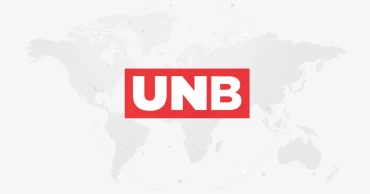
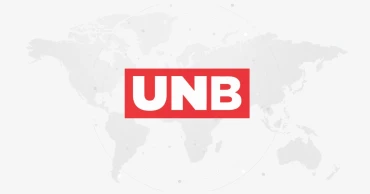

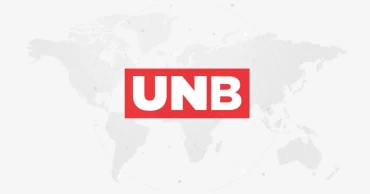
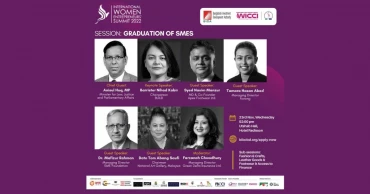
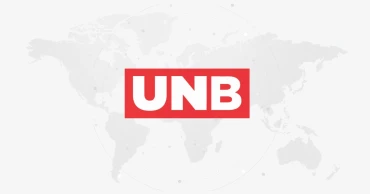
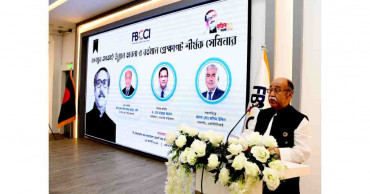
.jpg)








